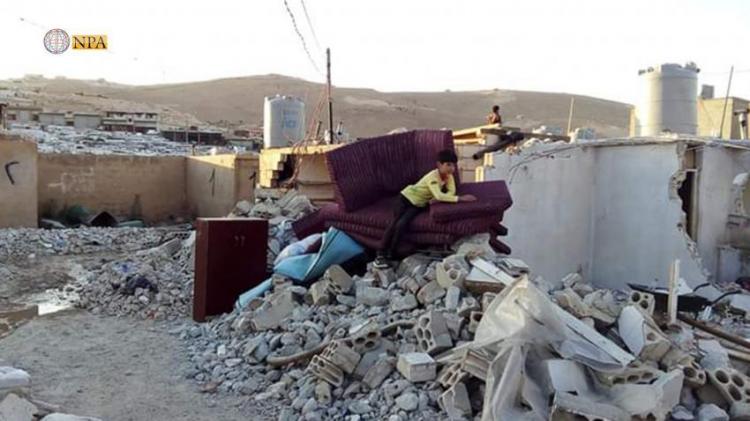Cement houses of Arsal land leveled, NGOs demand Lebanon to abide by Brussels Conference commitments
Beirut – North-Press Agency
Layal Kharroubi
The sounds of the demolition mix with the dust of the landfill to make a heavy night for the Syrian refugees in the Lebanese town of Arsal which is repeated for a whole month.
95% of the cement tents in the camp, were land leveled in implementation of the decision of the Supreme Defense Council, which was issued last April to demolish all the cement houses inhabited by Syrian refugees in various camps in Lebanon.
The demolition of cement houses or tents was conducted by the hands of the refugees themselves after the Lebanese army had named a deadline that ended last Monday, which witnessed the destruction of the army’s machines of 29 cement houses, according to sources told North-Press.
The sources also indicated that despite the fact that naming only Monday for direct demolition of the army, its armored vehicles heavily deployed on Wednesday in the camp, warning residents who did not demolish their houses, to implement the decision before tomorrow. Otherwise, the army will start demolishing them by itself.
During his talk with North-Press, Basel Al-Hujeiri, the mayor of Arsal, estimated the end of the process of demolition during the two coming days, “There were 4.000 cement tents that the Lebanese state considered as disorderly, today 3.500 of them have been destroyed by the refugees themselves and there is little left.”
Concerning the available alternatives for refugees who lost their houses, Al-Hujeiri pointed out that “the international organizations have provided canopies and wood to build alternative tents, there is a camp for emergency cases of the Red Cross where people are resorted to”, but Al-Hujeiri also explained that “a number of refugees were forced to stay in the open air or to some of the relatives until their status is adjusted.”
Human rights condemnation
The demolition of cement houses was condemned by seven human rights organizations including “Oxfam”, “the Norwegian Refugee Council” and “Save the Children” organizations, which, in a joint statement, considered that “the presence of members of the Lebanese army and the demolition of cement structures by heavy machinery are painful scenes for people who have lost so much in their own country.”
The humanitarian organizations also appealed the Lebanese government “to provide alternatives to refugees, to allow them to retain their personal properties and give them more time to secure shelters for themselves and their families.”
They called on it “to abide its commitments at the Brussels Conference, under which the Lebanese government received financial support to host the Syrian refugees with dignity.”
The town of Arsal on the Syrian border contains about 110 camps inhabited by nearly 70.000 displaced Syrians who came from the town of Al-Qseir in the countryside of Homs in summer of 2013 after fierce battles took place between the government forces and the armed opposition groups.
The background of the demolitions goes back to the meeting of the Supreme Defense Council held in mid-April, during which a series of decisions were taken regarding the Syrian refugees in Lebanon, the decision of the demolition included the deportation of Syrian citizens who entered Lebanon without passing through official crossings.
The Supreme Council is a mini-government that includes the president, the prime minister and a small number of ministers (Defense, Foreign affairs, Finance, Interior, and Economy), and it aims to implement the country’s defense policy.

